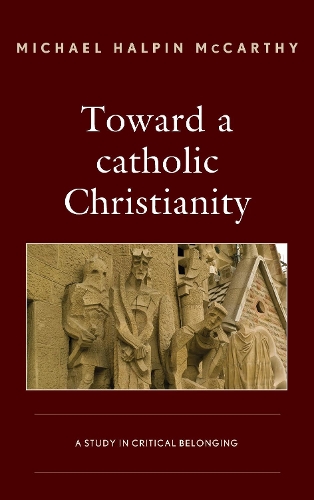
Toward a catholic Christianity: A Study in Critical Belonging
(Hardback)
Publishing Details
Toward a catholic Christianity: A Study in Critical Belonging
By (Author) Michael H. McCarthy
Bloomsbury Publishing PLC
Lexington Books
22nd December 2017
United States
Classifications
Professional and Scholarly
Non Fiction
Roman Catholicism, Roman Catholic Church
Christianity
History of religion
282
Physical Properties
Hardback
318
Width 159mm, Height 237mm, Spine 28mm
640g
Description
Critical belonging has been an essential feature of Christianity since its origin, but the forms it assumes understandably differ with the specific challenges Christians rise to meet throughout history. During the past two thousand years, these challenges have covered a broad spectrum: epistemic, moral, political, economic, religious, and spiritual. In our global society, all of these challenges seem to be occurring at once. Since no individual can meet all of them adequately, Toward a catholic Christianity tries to show how by working collaboratively the people of God can credibly meet them together. In this way, the diversity and unity within the Roman Catholic community are explicitly acknowledged and affirmed. For if that community is to become authentically Christian, it will need to become more genuinely catholic.
Reviews
This is a daring analysis of the attempt of the Second Vatican Council to bring forth a true way of being Christian in the modern world. McCarthy (emer., philosophy, Vassar College) has studied modernity and the Catholic Churchs responses to it. The book analyzes the Catholic Churchs own self-understanding and then applies this to the situation of the world today, speculating on what ways a Christian can adapt to the signs of the times while still being faithful to the true identity of the Catholic Church, what the subtitle refers to as critical belonging. McCarthy has studied this subject deeply for his entire career, and this seems his final analysis of the situation. That being so, it will likely prove most useful to scholars, researchers, and philosophers interested in the situation of the postmodern West. Those interested in a comprehensive primer on the subject of living authentically in the postmodern West might begin with Charles Taylors The Ethics of Authenticity (1992). A more explicitly Christian-centered interpretation that asks similar questions is Julin Carrn Perzs Disarming Beauty (2017). Summing Up: Highly recommended. Graduate students, researchers, faculty, professionals. * CHOICE *
An indefatigable participant in Catholic intellectual life, Michael McCarthy brings his informed sensitivity to bear on following Francis as a mature person of faith in a world gone awry. Abetted by two papacies which effectively sidelined Vatican II, we are now recalled to the teaching and practice of a church council obscured by controversy, and a gospel often compromised by the same. What a joy for us to celebrate with such clarity and focus. -- David B. Burrell, University of Notre Dame
The underlying conviction, concern, and hope that Michael H. McCarthy clearly expresses throughout this book is that the world of the 21st century needs the teachings of Christ. While this may sound offensive to non-believers and non-Christians, McCarthy is not preaching. Rather, he is questioning, exploring, and offering possibilities of ways of thinking that shed light on the significant challenges facing us all, and especially the young, in our current and future world. I believe the major contribution of the book is McCarthys insightful reflections where he draws on extensive and impressive sources, raises critical questions, and reveals an impressive scholarship. In a civilization that Julia Kristeva describes as having abandoned the meaning of the Absolute of Meaning, McCarthy presents another possibility, a possibility of hope, not nave but critically reflective, in an enduring Meaning. McCarthy manages to face squarely the challenges of modernity (and of post modernity) and continues to hope. In the end, this is what he believes is the importance of the Christian message. -- Christine Jamieson, Concordia University
Michael Halpin McCarthys Toward a catholic Christianity offers a compelling account of how one might deftly combine intellectual seriousness and ethical sensitivity with creative fidelity to the Catholic Church. McCarthys vision of Christian discipleship continues to extend the path blazed by his illustrious predecessors John Henry Newman, Bernard Lonergan, S.J., and Charles Taylor. Few scholars would be able to produce a work that reflects such historical learning, philosophical depth, and religious wisdom. McCarthys description of critical belonging captures beautifully what it means for one to love the church todaynot navely, but as an adult. If the church drives you crazy, you ought to read this book; if the church does not drive you crazy, you ought to read this book. -- Stephen J. Pope, Boston College
Author Bio
Michael Halpin McCarthy is professor emeritus of philosophy at Vassar College.
